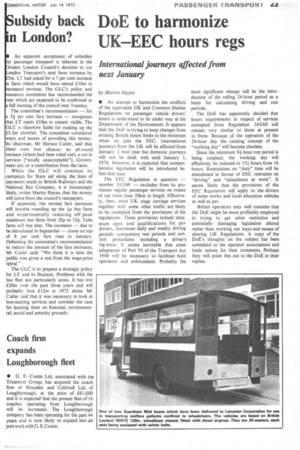ubsidy back DoE to harmonize n London? UK EEC hours regs
Page 25

If you've noticed an error in this article please click here to report it so we can fix it.
International journeys affected from next January
by Martin Hayes
An apparent acceptance of subsidies or passenger transport is inherent in the reater London Council's decision to cut ndon Transport's next fares increase by 5m. LT had asked for a 7 per cent increase fares which would have netted £10m in ncreased revenue. The GEC's policy and esources committee has recommended the uts which are expected to be confirmed at full meeting of the council next Tuesday.
The committee's recommendation — for a 3+ per cent fare increase — recognizes that LT needs £10m to remain viable. The GLC is therefore liable for making up the £5.3m shortfall. The committee considered ways and means of providing this money. Its chairman, Mr Horace Cutler, said that there were four choices: an all-round increase (which had been ruled out); a cut in services ("totally unacceptable"); Government aid; or a contribution from the rates.
While the GLC will continue its campaign for State aid along the lines of payments made to British Railways and the National Bus Company, it is increasingly likely, writes Martin Hayes, that the money will come from the council's ratepayers.
If approved, the revised fare increases will involve rounding up the ip bus fares and experimentally reducing off-peak maximum bus fares from 20p to 12p. Tube fares will rise also. The increases — due to be introduced in September — come on top of 8 per cent fare rises in January. Defending his corrimittee's recommendation to reduce the amount of the fare increases, Mr Cutler said: "We think it is time the public was given a rest from the wage-price spiral."
The GLC is to prepare a strategic policy for LT and its finances. Problems with the bus fleet are particularly acute. It has lost £20m over the past three years and will probably lose £12m in 1972 alone. Mr Cutler said that it was necessary to look at loss-making services and consider the case for keeping them on financial, environmental, social and amenity grounds. • An attempt to harmonize the conflicts of the equivalent UK and Common Market Regulations on passenger vehicle drivers' hours is understood to be under way at the Department of the Environment. It appears that the DoE is trying to keep changes from existing British hours limits to the minimum when we join the EEC. International journeys from the UK will be affected from January 1 next year but domestic journeys will not be dealt with until January 1, 1976. However, it is expected that comprehensive legislation will be introduced before that date.
The EEC Regulation in question — number 543/69 — excludes from its provisions regular passenger services on routes of not more than 50km in length. Effectively, then, most UK stage carriage services together with some other traffic are likely to be exempted from the provisions of the regulations. These provisions include minimum ages and qualifications for psv drivers, maximum daily and weekly driving periods, compulsory rest periods and control procedures including a driver's Log-book. It seems inevitable that some adaptation of Part VI of the Transport Act 1968 will be necessary to facilitate both operation and enforcement. Probably the most significant change will be the introduction of the rolling 24-hour period as a basis for calculating driving and rest periods.
The DoE has apparently decided that hours requirements in respect of services exempted from Regulation 543/69 will remain very similar to those at present in force. Because of the operation of the 24-hour day the existing concept of the "working day" will become obsolete.
Since the minimum 8+-hour rest period is being retained, the working day will effectively be reduced to 15+ hours from 16 hours. Restrictions on "duty" time will be abandoned in favour of EEC restraints on "driving" and "attendance at work". It seems likely that the provisions of the EEC Regulation will apply to the drivers of some works and local education vehicles as well as psv.
British operators may well consider that the DoE might be more profitably employed in trying to get other restrictive and potentially damaging legislation altered rather than working out ways and means of altering UK Regulations. A copy of the DoE's thoughts on the subject has been submitted to the operator associations and trade unions for their comments. Perhaps they will point this out to the DoE in their replies.






























































































